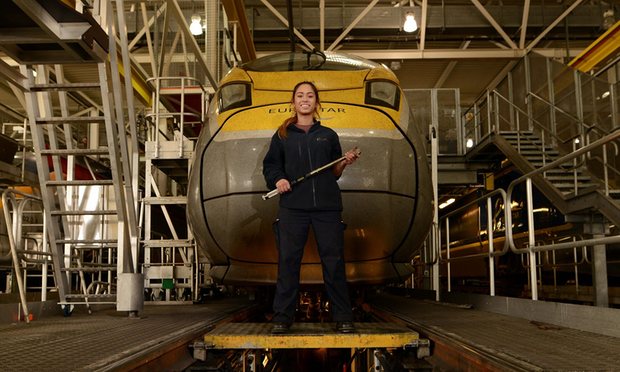Resumen: El Reino Unido tiene el menor porcentaje de mujeres ingenieros de todos los países de Europa. Sólo el 9% de la fuerza de trabajo de ingeniería y el 6% de los ingenieros y técnicos registrados son mujeres. Ese es el porcentaje más bajo de profesionales de la ingeniería femeninos en Europa, muy por detrás de los líderes, Letonia, Bulgaria y Chipre, con casi el 30%.
“When I was thinking about careers, I never thought of engineering, as the public image is being under a machine, getting dirty,” says Jade Aspinall, 23, a manufacturing engineer at missile producer MBDA Systems and winner of the higher apprentice of the year award in the National Apprenticeship Awards 2015.
“I work on minuscule components under a microscope in a clean room – there’s not a speck of dust anywhere,” Aspinall says. “It’s not something a lot of women would consider, just because they don’t know enough about it. There’s no doubt that there are a lot of male engineers, but as a woman, I’ve never been treated any differently. In fact, I’ve had a lot of support.”
It wasn’t until an MBDA apprentice spoke about engineering at her school that Aspinall considered it as a career. And she was one of the lucky ones who were made aware of it as an option.
There’s no telling how many women who could have made successful engineers never even considered it as a career option, but there must be plenty out there. Just 9% of the engineering workforce and 6% of registered engineers and technicians are female. That is the lowest percentage of female engineering professionals in Europe, way behind the leaders, Latvia, Bulgaria and Cyprus, with nearly 30%.
So what’s stopping the UK’s women going into engineering? Nothing physical – in fact, lots of schemes encourage them, says Dawn Bonfield, materials engineer and chief executive of the Women’s Engineering Society, including big employers such as British Gas, Network Rail and Crossrail. What’s holding them back is a lack of knowledge of what engineering is, and a lack of advice.
At the moment, Bonfield says, women are making it in the engineering world, but they tend to be the ones who are absolutely determined to do so. “We call them the Stem [science, technology, engineering or maths] devotees, and they will make it, no matter what,” she says. “But we’re determined to reach those women who might not have even considered engineering as a career.
“Engineering is a brilliant choice for women who want to do something, who have a big social conscience, and who want to change the world. It has just as much to offer as the ‘traditional’ professions such as law and medicine. It’s about making the world more sustainable and more renewable. There are fantastic challenges out there, and women are using engineering as a way of finding solutions.”
What needs to be done to encourage more women into the sector? Schemes such as MBDA’s are making a start. The company has achieved a 50/50 gender split within its engineering apprenticeships, something which spokesman Conal Walker attributes in part to the requirements of its outreach programme. Any school that wants an MBDA apprentice to give a talk must ensure that the audience has that 50/50 split too. It’s a figure that bucks the national trend, where just 7.4% of engineering apprenticeship starters in 2013-14 were female.
Bonfield wants the message around engineering to change to something far more positive. “It’s about applying a thought process to make things better,” she says, “whether that’s designing a nuclear power station or getting clean water to people in development countries.” But she wants to see far more careers information to back that message up, and an independent careers service for engineering to help unpick what can be a confusing choice of courses.
Aspinall agrees. “Engineering is such a broad church,” she says. “There needs to be much more awareness about the range of careers. Everything in the room where I’m sitting has been engineered. It’s a job for life. It gives you transferable skills, it’s exciting and it’s making things bigger and better as new technology comes along.”






 Users Today : 29
Users Today : 29 Total Users : 35460046
Total Users : 35460046 Views Today : 42
Views Today : 42 Total views : 3418673
Total views : 3418673